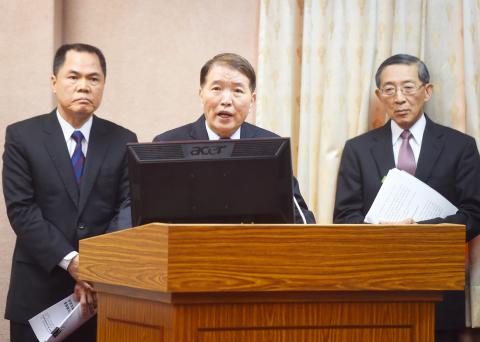Minister of Defense Kao Kuang-chi (高廣圻) yesterday said that tension has been rising in the South China Sea amid an arms race among nations in the region, and that Taiwan’s armed forces are ready to defend its remote island outposts.
Due to a potential military threat against Taiwan’s islands in the South China Sea, Kao said programs have been underway to enhance radar installations and electronic surveillance in the region and to improve the combat capability of the nation’s coast guard units stationed on the Pratas Islands (Dongsha Islands, 東沙群島) and Spratly Islands (Nansha Islands, 南沙群島).
According to a Ministry of National Defense report to the legislature’s Foreign Affairs and National Defense Committee, the ministry has mandated the Navy’s Marine Corps to train coast guard units on weapon handling, operating artillery guns and field combat drills, for those units deployed on Itu Aba Island (Taiping Island, 太平島) and other outposts in the South China Sea.

Photo: Chien Jung-fong, Taipei Times
It said that in recent years, defensive firepower on these outposts has been enhanced with the installation of Bofors 40mm guns and Taiwan’s own T-63 120mm mortar systems, which receive regular repair and maintenance checks by artillery technicians.
When asked by Democratic Progressive Legislator Wang Ting-yu (王定宇) if the ministry has deployed anti-air missile defense systems on these islands, Kao said he was not at liberty to answer.
China’s military and radar installations on Woody Island (Yongxing Island, 永興島), along with the lengthening of a runway to 3,000m might indicate that Beijing intends to declare an air defense identification zone (ADIZ) in the South China Sea, US Deputy Secretary of Defense Robert Work said on Wednesday.
National Security Bureau Deputy Director Chou Wu-mei (周伍美) said the bureau is aware of the situation and is monitoring developments in the South China Sea closely, as any unilateral declaration by China would increase tension in the region.
Chou said surveillance and intelligence gathering by the bureau and Taiwan’s armed forces indicate China has been undertaking preparations to enhance Woody Island’s basic infrastructure, and to deploy missile systems, jet fighters and other aircraft.
“However, we know that China does not yet have the military capability in the region to declare an ADIZ, therefore we believe it is unlikely China would do so in the near future,” he said.
The ministry report said China has already deployed its Red Flag-9 anti-air missiles on Woody Island — with a firing range of 200km — and is currently testing the Eagle Strike-62 anti-ship cruise missiles, that have a range of 300km.
Chou and Kao said the armed forces would assert national sovereignty claims and defend Taiwan’s islands and marine territories in the South China Sea, but they were not certain how long coast guard units could hold Itu Aba in the case of an attack.

Taipei has once again made it to the top 100 in Oxford Economics’ Global Cities Index 2025 report, moving up five places from last year to 60. The annual index, which was published last month, evaluated 1,000 of the most populated metropolises based on five indices — economics, human capital, quality of life, environment and governance. New York maintained its top spot this year, placing first in the economics index thanks to the strength of its vibrant financial industry and economic stability. Taipei ranked 263rd in economics, 44th in human capital, 15th in quality of life, 284th for environment and 75th in governance,

The Sports Administration yesterday demanded an apology from the national table tennis association for barring 17-year-old Yeh Yi-tian (葉伊恬) from competing in the upcoming World Table Tennis (WTT) United States Smash tournament in Las Vegas this July. The sports agency said in a statement that the Chinese Taipei Table Tennis Association (CTTTA) must explain to the public why it withdrew Yeh from the WTT tournament in Las Vegas. The sports agency said it contacted the association to express its disapproval of the decision-making process after receiving a complaint from Yeh’s coach, Chuang

Control Yuan Secretary-General Lee Chun-yi (李俊俋) tendered his resignation last night, admitting that he had misused a government vehicle, as reported by media. His resignation was immediately accepted by the Control Yuan. In a statement explaining why he had resigned, Lee apologized for using a Control Yuan vehicle to transport his dog to a pet grooming salon on May 20. The issue first came to light late last month, when TVBS News reported that Lee had instructed his driver to take the dog to the salon. The news channel broadcast photos that it said were taken by an unnamed whistle-blower, which purportedly showed the

A former officer in China’s People’s Liberation Army (PLA) who witnessed the aftermath of the 1989 Tiananmen Square massacre has warned that Taiwan could face a similar fate if China attempts to unify the country by force. Li Xiaoming (李曉明), who was deployed to Beijing as a junior officer during the crackdown, said Taiwanese people should study the massacre carefully, because it offers a glimpse of what Beijing is willing to do to suppress dissent. “What happened in Tiananmen Square could happen in Taiwan too,” Li told CNA in a May 22 interview, ahead of the massacre’s 36th anniversary. “If Taiwanese students or